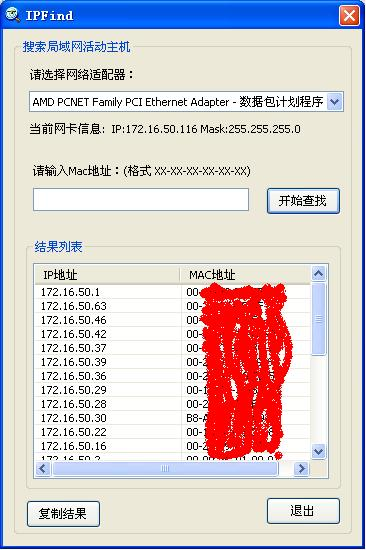This command can find alive hosts on linux:nmap -v -sn 192.168.1.1/24 | grep 'Nmap scan' | grep -v 'host down'
Reference:
- Nmap扫描原理与用法
- 通过ARP探测局域网活动主机
- 编写ARP扫描器探测局域网活动主机
- 如何获取局域网内其他主机的ip地址和mac地址
- icmp探测活动主机
- 利用ICMP数据包探测网络中的活动主机 VC++
- 使用ICMP协议来进行主机探测
- 一个简单扫描器的实现
##sample code
Find alive hosts with ARP protocol
// Find alive hosts with ARP protocol
// Win32 console project, compile with VS2005
// Create by Dennis
// 2013-04-09
// Reference:
// http://msdn.microsoft.com/en-us/library/aa366358(VS.85).aspx
#include <winsock2.h>
#include <iphlpapi.h>
#include <process.h>
#include <stdio.h>
#include <stdlib.h>
#pragma comment(lib, "iphlpapi.lib")
#pragma comment(lib, "ws2_32.lib")
CRITICAL_SECTION cs;
unsigned long netIp = 0;
// Get host IP
// Reference: http://blog.csdn.net/happycock/article/details/491424
// If your machine have more than one network adapter, you should
// fix this function.
void GetHostIP(char* ip, int size1, char* mask, int size2)
{
ULONG len = 0;
GetAdaptersInfo(NULL, &len);
PIP_ADAPTER_INFO p = static_cast<PIP_ADAPTER_INFO>(malloc(len));
GetAdaptersInfo(p, &len);
for (PIP_ADAPTER_INFO q = p; q != NULL; q = q->Next)
{
if (ip) strncpy(ip, q->IpAddressList.IpAddress.String, size1);
if (mask) strncpy(mask, q->IpAddressList.IpMask.String, size2);
break;
}
free(p);
}
unsigned int __stdcall ArpThread(LPVOID lParam)
{
ULONG MacAddr[2]; /* for 6-byte hardware addresses */
ULONG PhysAddrLen = 6; /* default to length of six bytes */
#if 1
EnterCriticalSection(&cs);
//converts to TCP/IP network byte order (which is big-endian)
unsigned long dstIP=htonl(++netIp);
LeaveCriticalSection(&cs);
#else
// Reference: http://blog.csdn.net/morewindows/article/details/7429155
//netIp++;
InterlockedIncrement((LPLONG)&netIp);
unsigned long dstIP=htonl(netIp);
#endif
if (NO_ERROR == SendARP(dstIP, 0,&(MacAddr[0]),&PhysAddrLen)) {
EnterCriticalSection(&cs);
BYTE* bPhysAddr = (BYTE *) & MacAddr;
if (PhysAddrLen) {
struct in_addr addr1;
memcpy(&addr1, &dstIP, 4);
printf("%16s : ", inet_ntoa(addr1));
for (int i = 0; i < (int) PhysAddrLen; i++) {
if (i == (PhysAddrLen - 1))
printf("%.2X\n", (int) bPhysAddr[i]);
else
printf("%.2X-", (int) bPhysAddr[i]);
}
} else
printf("Warning: SendArp completed successfully, but returned length=0\n");
LeaveCriticalSection(&cs);
}
return 0;
}
int main(int argc, char **argv)
{
IPAddr SrcIp = 0;
char strSrcIP[16] = {0};
char strSrcMask[16] = {0};
// Get Host IP and Mask
GetHostIP(strSrcIP, sizeof(strSrcIP), strSrcMask, sizeof(strSrcMask));
InitializeCriticalSection(&cs);
SrcIp = inet_addr(strSrcIP);
unsigned long findMask=inet_addr(strSrcMask);
int netsize = ~ntohl(findMask);
netIp = ntohl(SrcIp & findMask);
#if 0
unsigned long dstIp;
struct in_addr addr1;
HANDLE hThr[63] = {0};
for (int i=1; i<64; i++)
{
//converts to TCP/IP network byte order (which is big-endian)
dstIp=htonl(netIp+i);
hThr[i-1] = (HANDLE)_beginthreadex(NULL, 0, ArpThread, &dstIp, 0, NULL);
}
WaitForMultipleObjects(63,&(hThr[0]),TRUE,INFINITE);
#else
HANDLE *phThread = (HANDLE*)malloc(netsize*sizeof(HANDLE));
for (int i=1; i<netsize; i++)
{
// _beginthreadex if more effect than CreateThread
// you can google it for more information
phThread[i-1] = (HANDLE)_beginthreadex(NULL, 0, ArpThread, 0, 0, NULL);
}
// There is a limit count for function WaitForMultipleObjects
int netcount = netsize-1;
int waitcount = 0;
for (int i=0; i<netcount;)
{
waitcount = MAXIMUM_WAIT_OBJECTS;
if (netcount-i<MAXIMUM_WAIT_OBJECTS)
waitcount = netcount-i;
WaitForMultipleObjects(waitcount,&(phThread[i]),TRUE,INFINITE);
i += waitcount;
}
free(phThread);
#endif
DeleteCriticalSection(&cs);
//system("pause");
return 0;
}
output as below:(For security reasons, replace some of the characters as asterisks)
192.168.50.1 : **-**-E2-**-C7-**
192.168.50.2 : **-**-4C-**-00-**
192.168.50.16 : **-**-19-**-46-**
192.168.50.22 : **-**-09-**-3A-**
192.168.50.28 : **-**-AE-**-E6-**
...
192.168.50.129 : **-**-9B-**-19-**
192.168.50.238 : **-**-6F-**-28-**
Press any key to continue. . .
Find alive hosts with icmp protocol
// Find alive hosts with icmp protocol
// Win32 console project, compile with VS2005
// Create by Dennis
// 2013-04-09
// Reference:
// http://msdn.microsoft.com/en-us/library/windows/desktop/aa366050%28v=vs.85%29.aspx
#include <winsock2.h>
#include <iphlpapi.h>
#include <icmpapi.h>
#include <process.h>
#include <stdio.h>
#pragma comment(lib, "iphlpapi.lib")
#pragma comment(lib, "ws2_32.lib")
#define IP_SECTION "192.168.110.%d"
CRITICAL_SECTION cs;
int g_ip_index = 0;
unsigned int __stdcall IcmpThread(LPVOID LPARAM)
{
// Declare and initialize variables
EnterCriticalSection(&cs);
char ip[16] = {0};
sprintf(ip, IP_SECTION, ++g_ip_index);
HANDLE hIcmpFile;
unsigned long ipaddr = INADDR_NONE;
DWORD dwRetVal = 0;
char SendData[32] = "Data Buffer";
LPVOID ReplyBuffer = NULL;
DWORD ReplySize = 0;
ipaddr = inet_addr(ip);
if (ipaddr == INADDR_NONE) {
return 1;
}
hIcmpFile = IcmpCreateFile();
if (hIcmpFile == INVALID_HANDLE_VALUE) {
printf("\tUnable to open handle.\n");
printf("IcmpCreatefile returned error: %ld\n", GetLastError() );
return 1;
}
ReplySize = sizeof(ICMP_ECHO_REPLY) + sizeof(SendData);
ReplyBuffer = (VOID*) malloc(ReplySize);
if (ReplyBuffer == NULL) {
printf("\tUnable to allocate memory\n");
return 1;
}
LeaveCriticalSection(&cs);
dwRetVal = IcmpSendEcho(hIcmpFile, ipaddr, SendData, sizeof(SendData),
NULL, ReplyBuffer, ReplySize, 10);
#if 0
if (dwRetVal != 0) {
PICMP_ECHO_REPLY pEchoReply = (PICMP_ECHO_REPLY)ReplyBuffer;
struct in_addr ReplyAddr;
ReplyAddr.S_un.S_addr = pEchoReply->Address;
printf("\tSent icmp message to %s\n", ip);
if (dwRetVal > 1) {
printf("\tReceived %ld icmp message responses\n", dwRetVal);
printf("\tInformation from the first response:\n");
}
else {
printf("\tReceived %ld icmp message response\n", dwRetVal);
printf("\tInformation from this response:\n");
}
printf("\t Received from %s\n", inet_ntoa( ReplyAddr ) );
printf("\t Status = %ld\n",
pEchoReply->Status);
printf("\t Roundtrip time = %ld milliseconds\n",
pEchoReply->RoundTripTime);
}
else {
printf("\tCall to IcmpSendEcho failed.\n");
printf("\tIcmpSendEcho returned error: %ld\n", GetLastError() );
return 1;
}
#else
if (dwRetVal != 0)
printf("%16s is alive\n", ip);
#endif
}
int __cdecl main(int argc, char **argv) {
InitializeCriticalSection(&cs);
int netsize = 255;
HANDLE *phThread = (HANDLE*)malloc(netsize*sizeof(HANDLE));
for (int i=1; i<netsize; i++)
{
// _beginthreadex if more effect than CreateThread
// you can google it for more information
phThread[i-1] = (HANDLE)_beginthreadex(NULL, 0, IcmpThread, 0, 0, NULL);
}
// There is a limit count for function WaitForMultipleObjects
int netcount = netsize-1;
int waitcount = 0;
for (int i=0; i<netcount;)
{
waitcount = MAXIMUM_WAIT_OBJECTS;
if (netcount-i<MAXIMUM_WAIT_OBJECTS)
waitcount = netcount;
WaitForMultipleObjects(waitcount,&(phThread[i]),TRUE,INFINITE);
i += waitcount;
}
free(phThread);
DeleteCriticalSection(&cs);
system("pause");
return 0;
}
Output as below:
192.168.110.1 is alive
192.168.110.5 is alive
192.168.110.6 is alive
192.168.110.30 is alive
192.168.110.32 is alive
192.168.110.35 is alive
...
192.168.110.248 is alive
192.168.110.249 is alive
Press any key to continue. . .
IPFind
I have write a windows application with MFC, you can find the source code and execute file here IPFind
